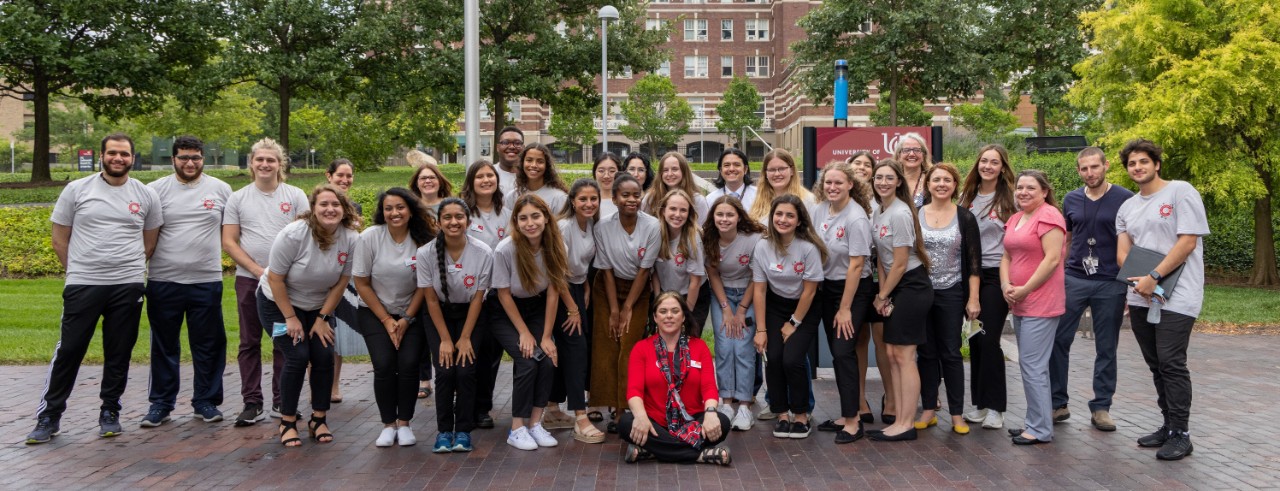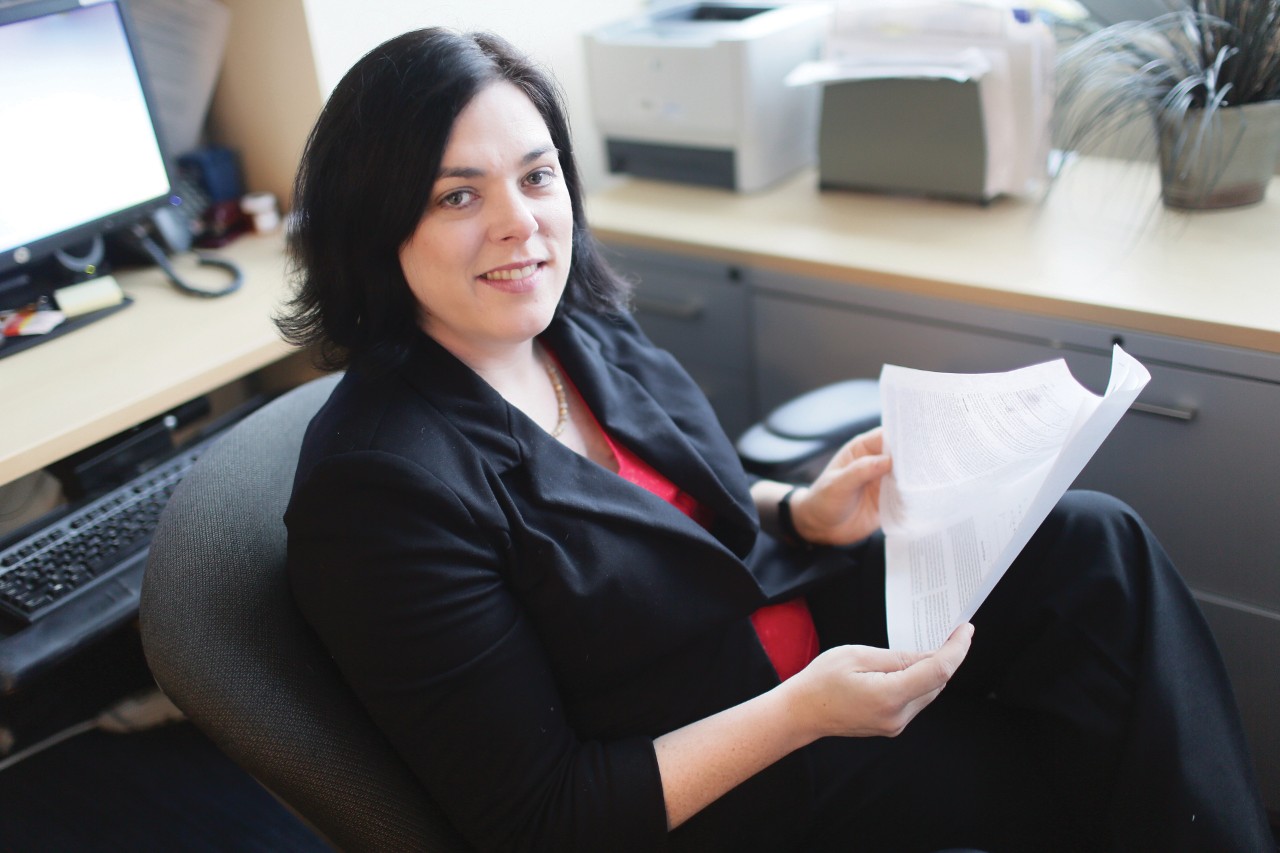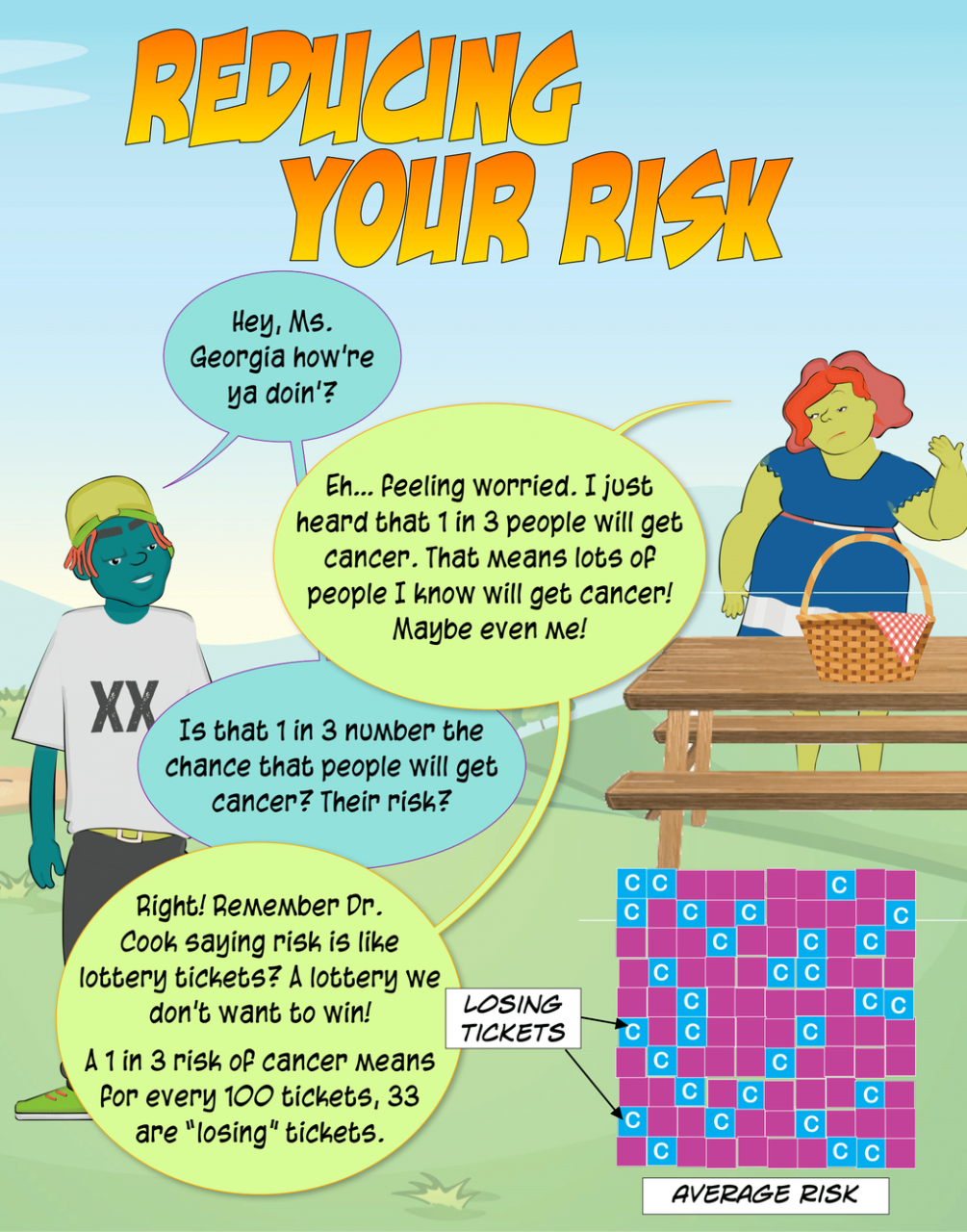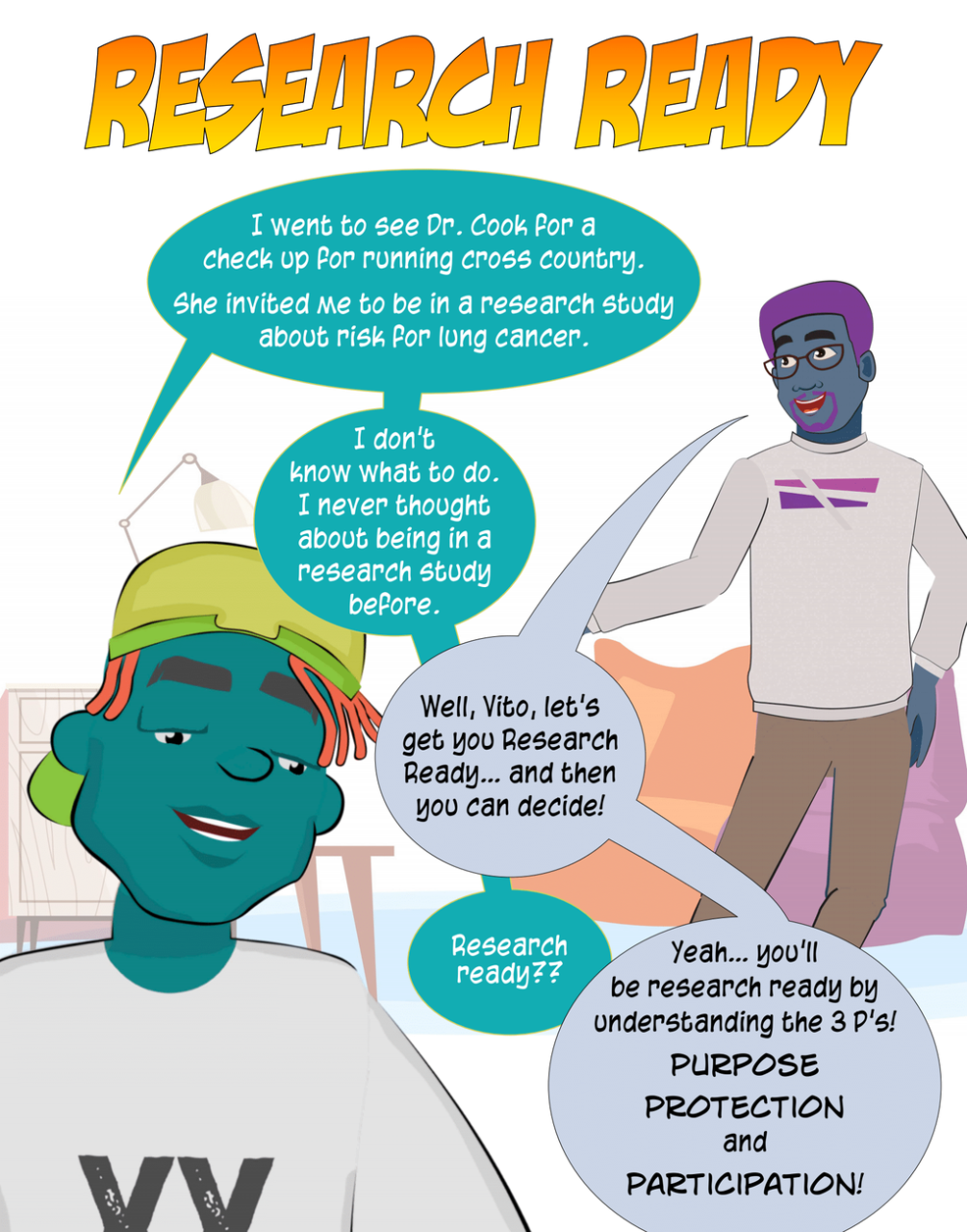
Improving community outreach and engagement
University of Cincinnati Cancer Center researchers present abstracts
As researchers continue to make advances in new cancer prevention and treatment methods, it will not have much impact if the community is unaware and not engaged. For this reason, community outreach and engagement (COE) efforts are an important pillar of the University of Cincinnati Cancer Center’s mission.
Cancer Center researchers will present research abstracts on several COE initiatives at the American Association for Cancer Research Annual Meeting 2023, held in Orlando, Florida, April 14-19.
Encouraging undergraduate community involvement

Melinda Butsch Kovacic, PhD. Photo/University of Cincinnati Cancer Center.
To overcome lack of access to cancer prevention, screening and treatment in underserved communities, it’s necessary for the health care workforce to be diverse and dedicated to understanding and being a part of the community they seek to serve.
The University of Cincinnati Cancer Center established the Cancer Research Scholars Program, supported in part by the National Cancer Institute, that offers 20-23 undergraduate students unique paid research opportunities and educational experiences including cancer topics, professional development, team science, cultural humility and microaggression training.
“By inviting trainees into the community early, we invite them to more fully see and experience the journeys of medically underserved populations,” said Melinda Butsch Kovacic, PhD, associate director for community outreach & engagement at the Cancer Center. “Such experiences, we hope, will help them better tailor their future care and research to these populations’ unique needs so that they can experience healing at least equal to those with greater resources.”
In 2022, scholars participated in summer field experiences including working with the Cancer Justice Network to better understand cancer-related grief, working with Queens Village Cincinnati volunteers to co-create a breast cancer awareness program for African American nursing mothers and offering a Reducing Your Risk Health Fair to Cincinnati’s Norwood community.
Butsch Kovacic said some scholars had never thought about how the life experiences of populations different than their own may affect their approach to cancer care and health care in general, while others had previously worked with medically underserved communities and had a good foundation to build upon.
“Together they were able to give us insights about how to improve our community outreach efforts for both participants and our invaluable volunteers,” she said. “We look forward to future efforts with new community partners and new scholars and hope to get greater participation from mentors too.”
Plans are already underway for the 2023 Cancer Research Scholars Program, and annual tracking of the scholars will help determine the program’s long-term impact on the cancer workforce.
Making health fairs more engaging
Typical health fairs have tables full of written educational information for attendees, but Butsch Kovacic, We Engage 4 Health and their research team implemented a different strategy through three-panel graphic style stories with a fourth panel that outlines health challenges and healthy actions related to a given topic.
“People tend to better engage with stories and understand complex information described in them. They are more easily remembered and acted on,” Butsch Kovacic said. “Plus, they are low stakes, meaning you can have a challenging discussion without having to get too personal by talking about the story character’s instead.”
Health fair attendees are invited to read the story aloud together, creating a more engaging and memorable experience as they talk through the story’s problem, action and resolution.
“The goal of this activity is to spur a meaningful discussion and a willingness to commit to healthy actions that relate to prevention and screening,” Butsch Kovacic said. “Some of our tables have hands-on science experiences to help attendees better understand the topic.”

Graphic-style stories like these make health information easier to engage with, remember and act upon later. Photo courtesy of We Engage 4 Health.
While initially the team was unsure if adults would appreciate the stories, Butsch Kovacic said they found they are useful for all ages.
“If we asked people who have never read one of our stories with us about their preference, many would not choose learning via this story-based method,” she said. “However, many choose this approach over mostly text and text with graphics after they have had the opportunity to experience learning in this way.”
With a goal to continue to make learning accessible, fun and actionable, Butsch Kovacic said the team plans to continue to use and adapt the materials and create new stories to best serve the communities they are working with.
Helping community members become research ready
Even as certain racial/ethnic minority groups get cancer more often, are diagnosed at younger ages and are at risk for earlier death, clinical trials are still lagging behind in including adequate representation from these groups.
To encourage more equitable participation and fight against cancer disparities, a research team led by Butsch Kovacic and We Engage 4 Health created a graphic-style story called “Research Ready.” The story follows a teen, Vito, considering whether he wants to participate in a clinical research study about lung cancer.
The Research Ready story is used by community research advocates to educate potential research participants on the purpose of cancer research, how they are kept safe while participating and why people from diverse backgrounds are needed to participate.
Butsch Kovacic said the aim of the initiative is for patients considering participating in research to make decisions “based on facts, not fears.”
“We encourage our participants to ask research study staff questions,” said Butsch Kovacic. “Our accompanying activity supports them in knowing what questions that they want to ask. Many marginalized groups fail to get access to the innovation and high-quality care associated with clinical trials because of fear as a result of historical injustices related to research.”

The Research Ready story follows Vito as he considers whether to participate in a research trial about lung cancer. Photo provided by We Engage 4 Health.
Initial data from the pilot program showed these discussions have been useful in increasing hesitant patients’ willingness to consider research participation and their perception of research safety.
When working with cancer survivors to develop the program, many said it is better to have survivors serving as the advocates guiding patients through the information. As the program expands, Butsch Kovacic said more survivors will be trained to serve as advocates.
“Their role would be to facilitate the reading of the story, activity and discussion in a non- judgmental way and without pressuring participants to participate,” Butsch Kovacic said. “Instead, this discussion is about discovery and an invitation to consider participation.”
Helping adolescents become research ready
The research team used the same Research Ready story and activity targeting adolescents, who often have a lower perception of risk and are more susceptible to peer pressure from parents and family members when making decisions about research participation.
“This work is about introducing health science research and clinical research to youth,” Butsch Kovacic said. “We found that their perceptions of safety are critical in their decision making and that youth regardless of racial group similarly benefit from reading the story aloud together and participating in the accompanying decision-making activity.
The data suggests the Research Ready approach may be a useful tool in promoting future research participation and engaging a variety of adolescent ethnic and racial groups commonly underrepresented in cancer research.
- Undergraduate cancer research scholars’ community field experiences encourage community engagement to curb future disparities in the cancer workforce will be presented April 18 from 1:30-5 p.m. by Butsch Kovacic during the Community-based Research and Biobanking Research poster session.
- Reducing your risk cancer-focused health events to meaningfully engage the medically underserved and diminish future cancer disparities will be presented by Butsch Kovacic April 18 from 9 a.m. to 12:30 p.m. during the Diet, Nutrition, Lifestyle and Environment and Cancer Prevention poster session.
- Community cancer research advocates: Helping underrepresented minority groups become research ready will be presented April 16 at 4:01 p.m. during the Patient and Community Advocate Partners in Cancer Research special session and April 18 from 1:30-5 p.m. during the Community-based Research and Biobanking Research poster session. UC research scientist and cancer survivor Alique Topalian, PhD, will present the research.
- Research Ready graphic-style story to support future research participation among adolescents will be presented April 18 from 1:30-5 p.m. during the Community-based Research and Biobanking Research poster session by Lauren Bates, PhD, postdoctoral fellow.
Impact Lives Here
The University of Cincinnati is leading public urban universities into a new era of innovation and impact. Our faculty, staff and students are saving lives, changing outcomes and bending the future in our city's direction. Next Lives Here.
Featured photo at top of Cancer Research Scholars. Photo/University of Cincinnati Cancer Center.
Related Stories
Learning more about how cancer affects stroke risk
October 16, 2023
A collaborative team led by University of Cincinnati, University of North Carolina and Duke University researchers is studying how specific cancers and treatments affect patients' risk of stroke.
Head and neck, breast cancer research highlights AACR abstracts
April 14, 2023
University of Cincinnati Cancer Center researchers will present more than a dozen abstracts at the American Association for Cancer Research Annual Meeting 2023, held in Orlando, Florida, April 14-19, including findings that could advance treatments for head and neck and breast cancers.
Unlocking the mysteries of cell migration
June 6, 2022
The University of Cincinnati's Atsuo Sasaki and an international team of collaborators have been awarded a Human Frontier Science Program research grant to learn more about how cells migrate, with an ultimate goal of developing new treatments to prevent cancer growth and spread.
